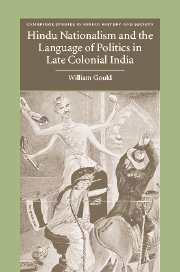Book contents
- Frontmatter
- Contents
- Acknowledgements
- Glossary
- List of abbreviations
- 1 Introduction
- 2 Congress and the Hindu nation: symbols, rhetoric and action
- 3 Muslims, mass movements and untouchable uplift
- 4 The Aryan Congress: history, youth and the ‘Hindu race’
- 5 Congress radicals and Hindu militancy
- 6 Congress ‘Raj’, riots and Muslim mass contacts
- 7 Congress, Pakistan and volunteer militarism
- 8 Conclusion
- Bibliography
- Index
- Other titles in the series
3 - Muslims, mass movements and untouchable uplift
Published online by Cambridge University Press: 11 July 2009
- Frontmatter
- Contents
- Acknowledgements
- Glossary
- List of abbreviations
- 1 Introduction
- 2 Congress and the Hindu nation: symbols, rhetoric and action
- 3 Muslims, mass movements and untouchable uplift
- 4 The Aryan Congress: history, youth and the ‘Hindu race’
- 5 Congress radicals and Hindu militancy
- 6 Congress ‘Raj’, riots and Muslim mass contacts
- 7 Congress, Pakistan and volunteer militarism
- 8 Conclusion
- Bibliography
- Index
- Other titles in the series
Summary
the rallying of all communities under the banner of independence will automatically remove all obstacles in the way of a satisfactory solution of all communal questions
(Motilal Nehru, 7 May 1930).The religious rhetoric, language and organisation highlighted in chapter 2 showed how a number of UP Congressmen made a subtle but decisive connection between the Indian nation and the experience of being a ‘Hindu’. For some Congressmen, this was simply an unspoken assumption. For others, Hinduism contained a natural toleration and inclusiveness that facilitated national unification and cultural and religious absorption. A sense of ‘Hindu unity’ was part of a foundation myth – based upon less concrete, but broad principles of assimilation. There was a qualitative difference between this broad array of positions within the UP Congress and the ‘hard’ ideology of the 1930s' Hindu Mahasabha of Savarkar which explicitly set out the connection between ‘Hindutva’ (Hindu-ness) and the nation. However, it is apparent that UP Muslims noticed associations between sections of the UP Congress and the Hindu Mahasabha. There were key points of contact, particularly in notions of the ‘secular’ nation as a solution for India's societal diversity. Indeed, as the words of Nehru above suggest, for many the future state as imagined by the Congress, perhaps through the engine of ‘Hindu’ civilisational toleration, would put a final end to all communalism.
The interplay and relationships between ideological positions and political languages concerning the ‘Hindu’ were subtle, as the last chapter set out.
- Type
- Chapter
- Information
- Publisher: Cambridge University PressPrint publication year: 2004



